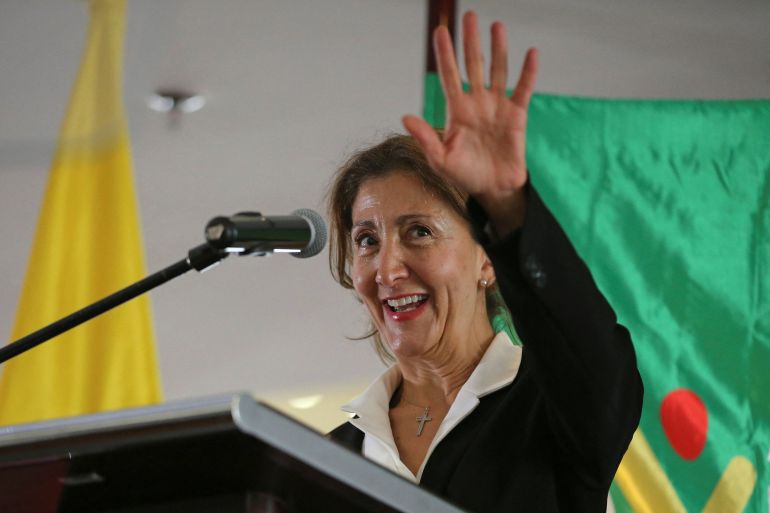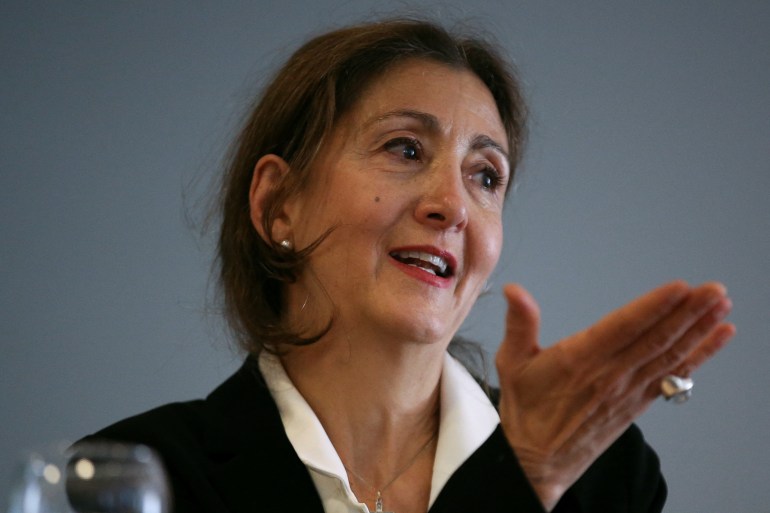Colombia’s Ingrid Betancourt announces presidential bid
Betancourt was kidnapped by FARC rebels in 2002 while campaigning for president, and held captive for six years.

Ingrid Betancourt, a Colombian politician who was kidnapped and held hostage for six years by an armed rebel group, has launched a fresh bid for the presidency.
The announcement comes almost two decades after the former congresswoman was kidnapped by the Revolutionary Armed Forces of Colombia (FARC) in 2002 while campaigning for Colombia’s top office.
Keep reading
list of 3 itemsColombian forces committed ‘serious’ abuses during protests: UN
Colombia: At least 23 dead in clashes between armed rebel groups
The leader of the Oxygen Green Party, Betancourt told reporters on Tuesday that she would vie to become the nominee to represent centrist parties in the race. If she wins the nomination, she will contest the first-round presidential election on May 29.
“Today I am here to finish off what I started with many of you in 2002,” the 60-year-old said during a news conference. “I am here to claim the rights of 51 million Colombians who are not finding justice because we live in a system designed to reward criminals.”
Betancourt’s bid for the presidency comes after Colombia was rocked by mass protests last year demanding government action to address education, healthcare, poverty, police violence and other social issues.
Rights groups and international observers have accused the Colombian security forces of committing “serious” human rights violations during a crackdown on the demonstrations, which began in April 2021 over a tax reform proposal. Last month, the UN High Commissioner for Human Rights said government agents used “unnecessary or disproportionate force” during the protests.
Betancourt’s announcement also comes months after other candidates have already been campaigning throughout the country ahead of the presidential vote later this year.
Gustavo Petro, a leftist former mayor of Bogota who is currently ahead in the polls, has tapped into widespread frustration with corruption and economic inequalities that have soared during the coronavirus pandemic.
Al Jazeera’s Alessandro Rampietti, reporting from Colombia’s capital, Bogota, said many people in the country were surprised by Betancourt’s decision to run for office.
“It comes at a critical time in the country, when Colombians are extremely angry at the political establishment, at the increase in violence,” Rampietti said, adding that the electorate remains deeply divided.

“She presented herself as somebody who could try to reunite this country, unite Colombians around her personal story, which she says is similar to the [lives] of most Colombians.”
Betancourt’s story is well known in the South American nation. She spent six years in rebel camps deep in the Amazon jungle, where sometimes fighters would tie her to a tree with metal chains to prevent her from escaping.
Her proof of life videos, in which she asked officials to investigate the circumstances that led to her own kidnapping, and then pleaded with the government to resume peace talks with the FARC rebels, were aired widely in Colombia and abroad.
The politician became a symbol of international campaigns seeking peace talks in Colombia and the liberation of FARC hostages.
Her time in captivity ended in 2008 through a military operation in which Colombian soldiers disguised as humanitarian workers snatched Betancourt and several other hostages from the FARC without firing a single bullet.
The FARC disarmed and disbanded under a 2016 peace pact that ended Colombia’s decades-long internal war, and it has since transitioned into a political party.
Betancourt withdrew from public life after being freed, spending much of her time with family in France. But she returned to Colombia’s political scene last year as the country prepared for elections that will be held in May.
While announcing her run for the presidency, Betancourt said she would fight to end impunity for corrupt politicians while addressing economic disparities that have long afflicted Colombia.
“My story is the story of all Colombians,” Betancourt said. “While me and my colleagues were chained by the neck, Colombian families were chained by corruption, violence and injustice.
“While our captors deprived us of food, mafiosi and politicians continued to steal and waste our resources without caring for children who go without breakfast here in Colombia.”